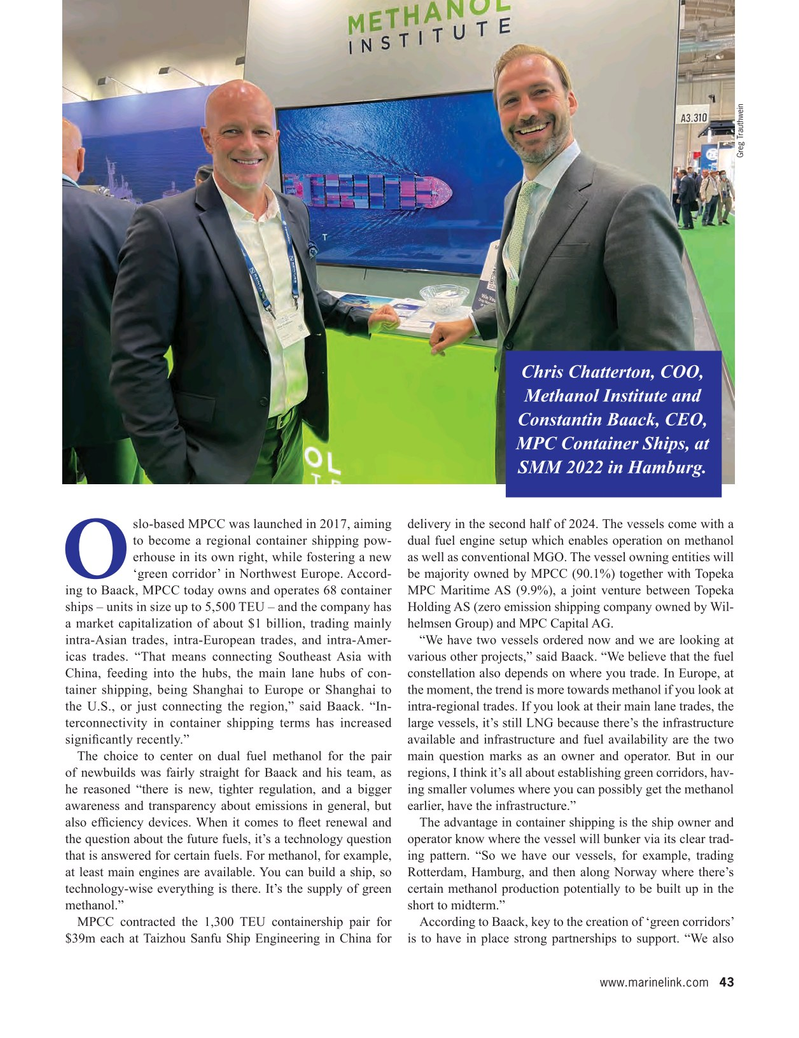
Page 43: of Maritime Reporter Magazine (November 2022)
The Workboat Edition
Read this page in Pdf, Flash or Html5 edition of November 2022 Maritime Reporter Magazine
FEATURE METHANOL SHIPS
Greg Trauthwein
Chris Chatterton, COO,
Methanol Institute and
Constantin Baack, CEO,
MPC Container Ships, at
SMM 2022 in Hamburg. slo-based MPCC was launched in 2017, aiming delivery in the second half of 2024. The vessels come with a to become a regional container shipping pow- dual fuel engine setup which enables operation on methanol erhouse in its own right, while fostering a new as well as conventional MGO. The vessel owning entities will
O ‘green corridor’ in Northwest Europe. Accord- be majority owned by MPCC (90.1%) together with Topeka ing to Baack, MPCC today owns and operates 68 container MPC Maritime AS (9.9%), a joint venture between Topeka ships – units in size up to 5,500 TEU – and the company has Holding AS (zero emission shipping company owned by Wil- a market capitalization of about $1 billion, trading mainly helmsen Group) and MPC Capital AG.
intra-Asian trades, intra-European trades, and intra-Amer- “We have two vessels ordered now and we are looking at icas trades. “That means connecting Southeast Asia with various other projects,” said Baack. “We believe that the fuel
China, feeding into the hubs, the main lane hubs of con- constellation also depends on where you trade. In Europe, at tainer shipping, being Shanghai to Europe or Shanghai to the moment, the trend is more towards methanol if you look at the U.S., or just connecting the region,” said Baack. “In- intra-regional trades. If you look at their main lane trades, the terconnectivity in container shipping terms has increased large vessels, it’s still LNG because there’s the infrastructure signi? cantly recently.” available and infrastructure and fuel availability are the two
The choice to center on dual fuel methanol for the pair main question marks as an owner and operator. But in our of newbuilds was fairly straight for Baack and his team, as regions, I think it’s all about establishing green corridors, hav- he reasoned “there is new, tighter regulation, and a bigger ing smaller volumes where you can possibly get the methanol awareness and transparency about emissions in general, but earlier, have the infrastructure.” also ef? ciency devices. When it comes to ? eet renewal and The advantage in container shipping is the ship owner and the question about the future fuels, it’s a technology question operator know where the vessel will bunker via its clear trad- that is answered for certain fuels. For methanol, for example, ing pattern. “So we have our vessels, for example, trading at least main engines are available. You can build a ship, so Rotterdam, Hamburg, and then along Norway where there’s technology-wise everything is there. It’s the supply of green certain methanol production potentially to be built up in the methanol.” short to midterm.”
MPCC contracted the 1,300 TEU containership pair for According to Baack, key to the creation of ‘green corridors’ $39m each at Taizhou Sanfu Ship Engineering in China for is to have in place strong partnerships to support. “We also www.marinelink.com 43
MR #11 (34-49).indd 43 11/4/2022 11:25:48 AM

 42
42

 44
44
